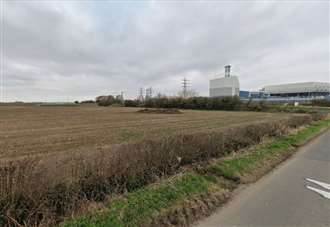
A plan to cover a field on the edge of Lynn with large industrial batteries has been rejected by councillors, with fears it could be a fire risk.
The bid would have seen a 5.4-acre energy storage facility built on High Road, Saddlebow, opposite Lynn Power Station.
West Norfolk Council planning officials had recommended the scheme for approval, ahead of a planning meeting on Monday.
However, councillors voted against the plan, with concerns the batteries could be a fire hazard and – despite being close to the power station and industrial sites – would represent development of the countryside.
Concerns over the safety risks of such battery sites – an important part of the green energy revolution – have grown in recent months. Once alight, the batteries are extremely difficult to extinguish,
South and West Lynn councillor Alexandra Kemp said: “This is a facility, which will be there for 40 years. It took 100 firefighters to put out a fire some years ago at [the nearby] Palm Paper we don’t need another risk here, just upwind of where [people] live.”
Charles Joyce, the Labour group leader, echoed the call, arguing the site was classed as a green field, an area where development not for agricultural purposes “should be resisted”.
He also argued that it went against council policy and case law.
Nicola Thornton, speaking on behalf of developer Cambridge Power, insisted the site would be safe.
She said: “While concerns about fire risk are understandable, only one of the 161 operational energy storage sites in the UK has been subject to a fire incident.
“The site of that fire used a different less stable type of lithium-ion battery to those proposed here.
“Reducing fire risk is a top priority for the industry and for Cambridge Power.”
Councillors voted to reject the plan arguing it would be development in the countryside, harm the landscape, and potentially impact on watercourses and public safety.










